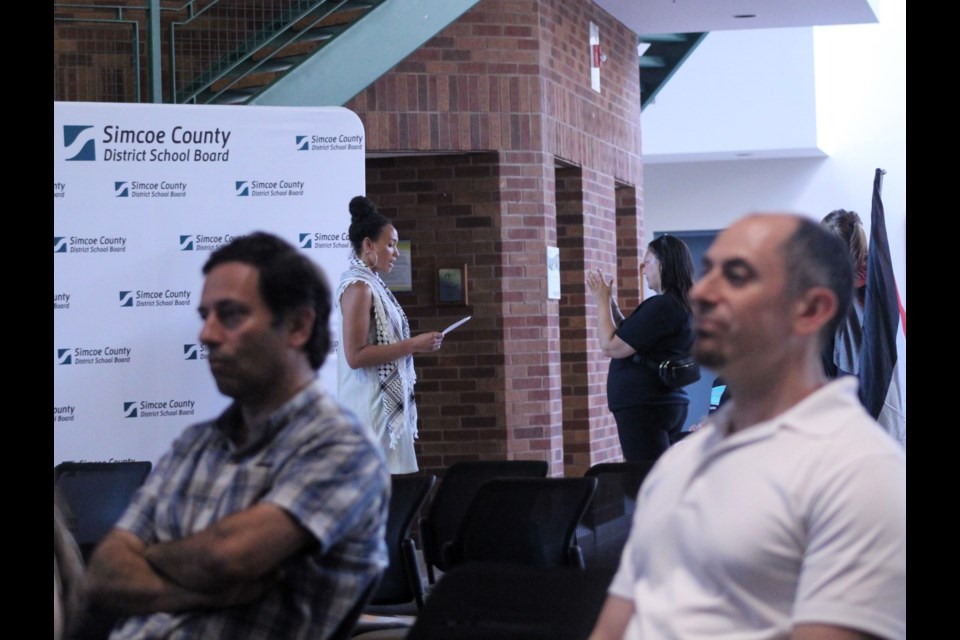After being denied a spot on the public school board meeting agenda, a Simcoe County anti-racism advocate delivered her speech in the hallway.
Natasha Shakespeare, founder of Parents Against Racism Simcoe County (PARSC) isn’t a stranger to the Simcoe County District School Board (SCDSB), having done multiple delegations before the board over the past three years on various topics under the themes of equity and inclusion.
This week, the group was denied approval from the board to do a delegation. The group attended the June 19 SCDSB’s regular board meeting anyway, delivering a deputation in the hallway while the meeting continued, within earshot of trustees and attendees.
“We asked them to reconsider and they would not, so we decided we would come tonight and share it here,” Natasha Shakespeare, founder of PARSC told CollingwoodToday prior to the meeting.
The hallway delegation called on the board to adopt more equitable hiring practices, specifically when it comes to hiring for the role of Director of Education. They allege that hiring for the current director John Dance in 2021 was done behind closed doors without a formal job posting, and is an example of favouritism within the board as Dance was appointed to the role from within.
Dance had served previously as a teacher, principal, superintendent and associate director of education all within the Simcoe County public board.
Delegations at the Simcoe County District School Board must be approved by the chair Orillia/Severn/Ramara trustee Jodi Lloyd. Following the meeting, Village Media asked Lloyd why she denied the delegation this week.
She clarified that a delegation can be made in writing or in person, and the board accepted it as a written delegation this time.
“It was a decision that was made based on timing and the lengthy agenda we had for tonight. It’s very common; other boards accept delegations in writing,” said Lloyd, adding that the written delegation was circulated to all trustees. “It’s still being heard.”
The delegation referenced the board’s equity audit, completed in August 2022 by Turner Consulting Group. The 133-page report made recommendations on how the board can amend their existing policies/add new policies to make them more inclusive, and includes anonymized staff comments on personal experiences working for the board. About 1,225 people participated in the consultations, which represents about 20 per cent of the board’s employees.
“Throughout the consultations, the phrase 'old boys’ club' was repeatedly used to describe the culture of leadership at the SCDSB,” notes one of the conclusions of the audit. “Participants expressed their concern that this culture creates many barriers to advancement for employees from diverse communities, backgrounds, and identities, as they are not seen as the ‘right fit’ for leadership positions.”
“Just about all of the focus group participants shared their frustration with the board’s equity journey,” it reads.
When it comes to employee perceptions of the SCDSB’s hiring process, when asked if they believe favouritism has a significant impact on who is hired and who advances at the SCDSB, the majority of respondents agreed with the statement.
Broken down further, 70 per cent of Indigenous staff, 72 per cent of racialized staff, 69 per cent of staff with disabilities, 67 per cent of LGBTQ+ staff, 64 per cent of white female staff and 53 per cent of white male staff agreed with the statement.
“Employees expressed an overall lack of confidence that the board’s hiring practices are fair and consistent,” it reads.
To read the SCDSB’s full employment equity audit, click here.
Shakespeare’s delegation on Wednesday called on the board to adopt external measures and incorporate community input into hiring practices, adding that it can lead to a more equitable process through transparency, accountability, community-centred decision making and consideration of diverse and inclusive candidate pools.
Specific recommendations included that the board should implement an external recruitment process, conduct community consultations when hiring in the future for the director role and establish a diverse search committee.
“If you don’t have leadership from the top committed to this work, it doesn’t trickle down,” she said.
PARSC started in November 2020 as a non-profit organization committed to fighting racism and discrimination in Simcoe County. The non-profit educates, trains and advocates for individuals, groups, organizations and institutions to invest in interrupting racism whenever encountered.
A major part of their work includes acting as advocates for families while they navigate systems in place when an incident of racism occurs, which is done through referrals.
“We do most of our referrals from this board,” said Shakespeare. “Given what we’ve seen this year, we think it’s really important we have leadership who is committed to dismantling oppressive systems. We’re just not seeing that.”
While Shakespeare was doing her delegation in the hallway on Wednesday night, the board approved a motion from closed session to accept Dance’s resignation as of Dec. 31, 2024 as he moves into retirement.
An announcement on who will fill the role next has not yet been made.
